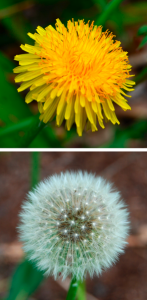Ah, those dandelions!
Personally, I am not a total zealot when it comes to banning chemicals in the garden. I cannot imagine not using Roundup (glyphosate) for troublesome weeds – digging them up and composting them is better, but cannot always be done.
More about Roundup below.
However, I never use pesticides (insecticides) except the mosquito killer Bacillus thuringiensis. There seems very little point indeed trying to encourage birds and snakes and bees and butterflies and toads and foxes and dragonflies…..if we are either going to wipe out their food or poison them directly.
Glyphosate (“Roundup”) is the weed killer most gardeners use to keep weeds under control in flower beds. It is absorbed through leaves (a ‘systemic’ herbicide) and kills all types of plant, by interfering with the way plants make amino acids for proteins. For this reason, it only works on actively growing weeds (well, any plant, ‘weed’ or not!)
Happily, the herbicide itself, when diluted and ready for use, is almost completely non-poisonous if you swallow it (although please do not try to prove me wrong, as it is mixed with detergents that CAN harm you), and the same good news applies to all mammals. It does not build up in animal tissue and does not seem to have proven cancer-causing potential. Some background to that area here.
Alas, we are looking afresh at these chemicals and their ability to affect reproduction – so-called gender benders or (posh name) endocrine disruptors. Studies in the lab suggest that glyphosate might interfere with the making of testosterone. Another reason we should always be vigilant and careful when handling garden chemicals
This herbicide is tightly ‘sequestered’ (grabbed hold of and kept) by. soil, and, although it hangs around in the soil for a while, especially in cold areas, it seems to be broken down by soil bacteria. There is some evidence that useful bacteria that turn atmospheric nitrogen into fertilizer (‘nitrogen fixers’) are negatively affected by glyphosate…and – somewhat perversely – crops seem more susceptible to disease if glyphosate is in the soil.
In the form that we gardeners use, glyphosate is quite poisonous for aquatic life. It persists for some months and affects fish and other water-living animals. Ironically, there are versions especially formulated for aquatic use that are less dangerous, but of course they are not the ones that will wash into waterways from our yards.
Even chemicals targeting weeds, designed not to affect invertebrates, can have effects on the ecosystem. The Xerces Society has some very authoritative publications on this.
Bacillus thuringiensis. Often called “B.T,” this is a biological insecticide, that is, a disease that affects moths and butterflies – and is also used against mosquito larvae in water – and you can buy the BT “rings” to drop into your ponds and fountains. It leaves other things like fish and frogs alone. Cool!
Other pesticide information can be found at….
Gorgeous dandelion picture thanks to…
CC-BY-SA-3.0/Matt H. Wade at Wikipedia
Questions? Comments? E-mail me on johnnydogmatic@comcast.net
